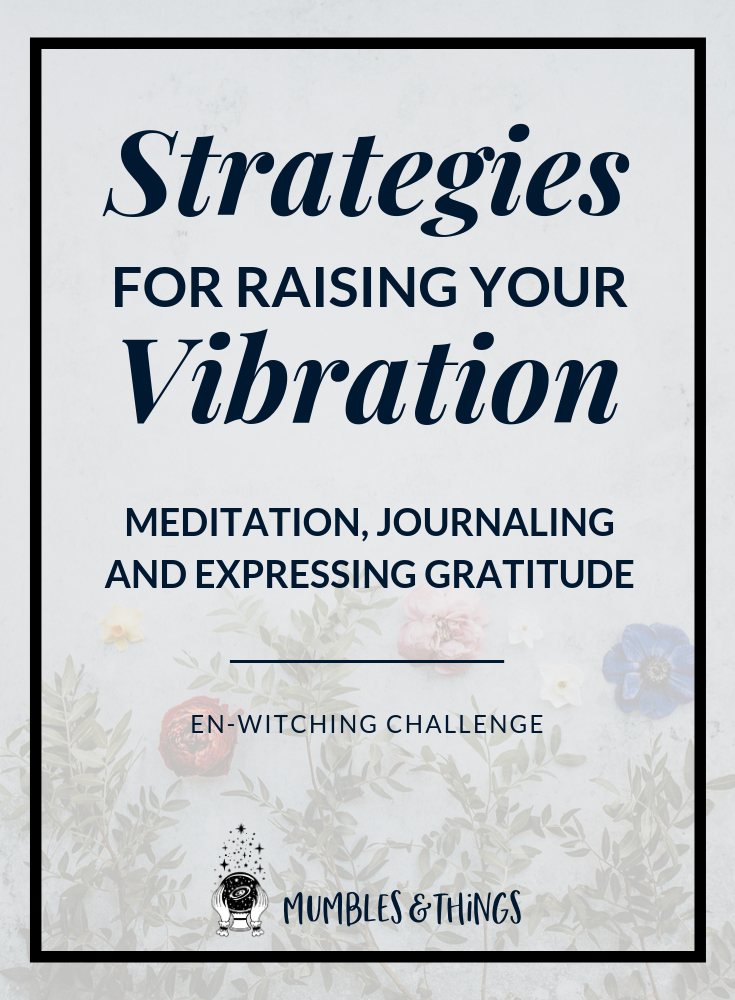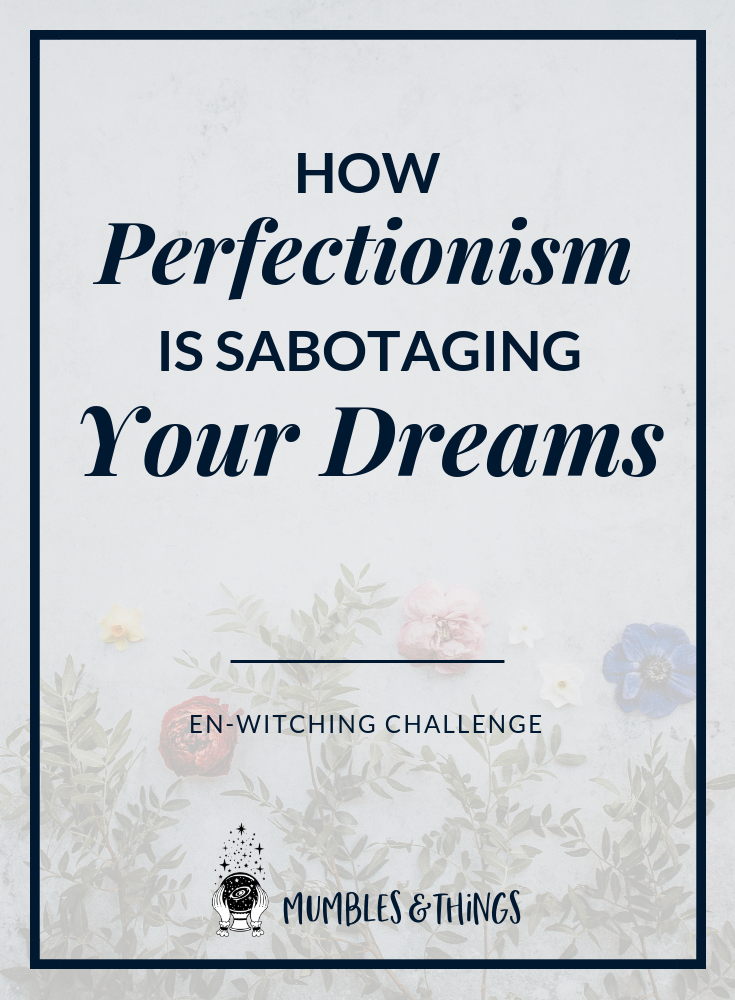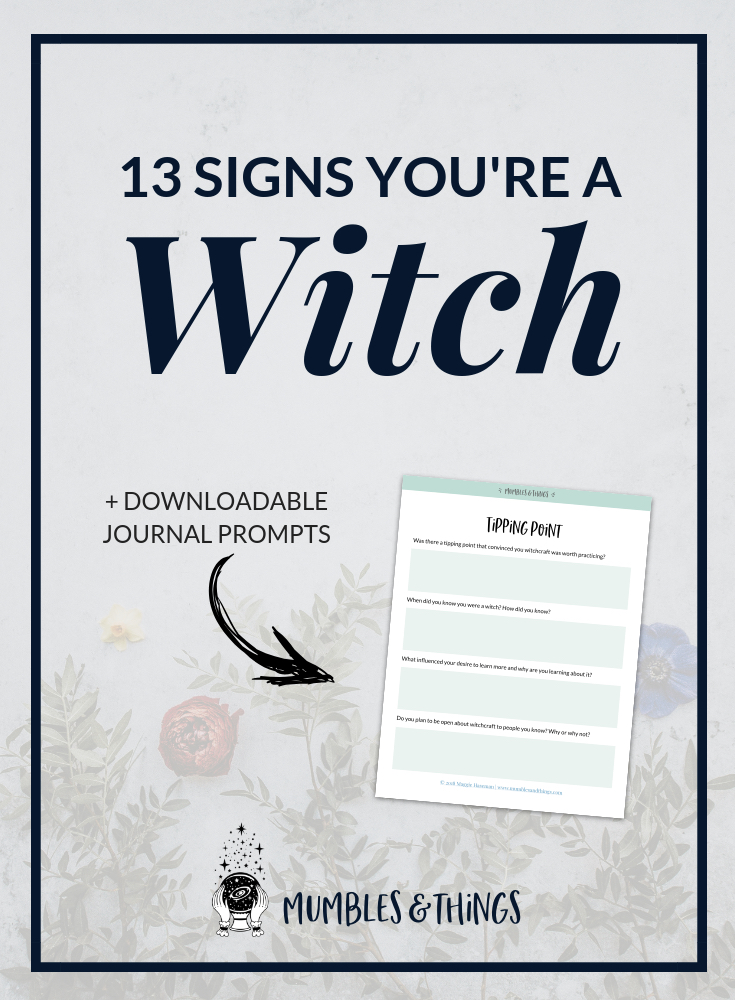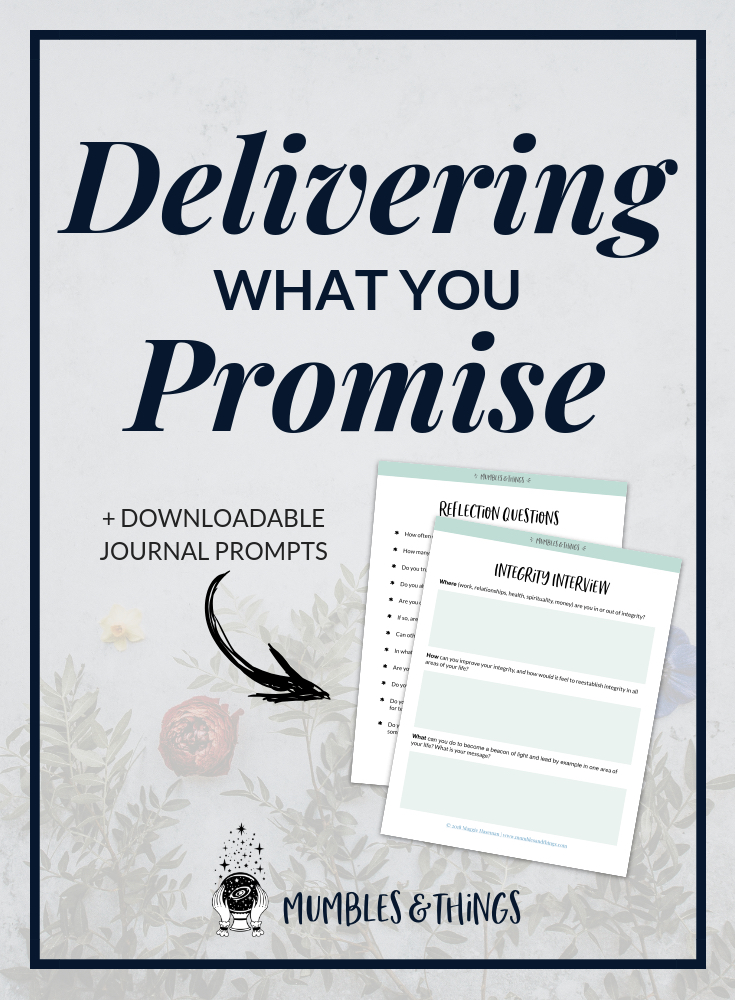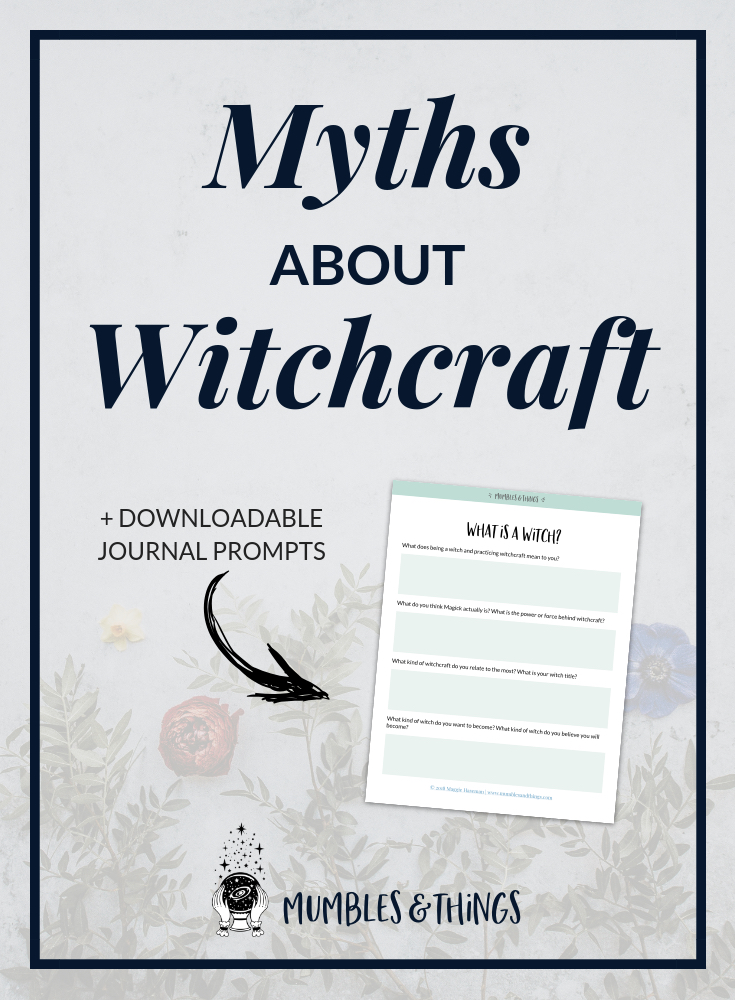Three Strategies for Raising Your Vibration
You’re in the right place if you…
want to learn three strategies for raising your vibration.
want to better understand how meditation helps your magic.
want to discover some techniques for witchy journaling.
want to learn about expressing gratitude and why.
I recently shared a series of blog posts about limiting and empowering beliefs and what thoughtforms are. In this post I’ll give you three strategies for raising your vibration in order to shift your thought and behavior patterns.
Before we gets started, it’s important to know that your own thoughts, beliefs and emotions are key to attracting what you desire. This is true no matter which area of life you’re working with. In order to change these habits and ultimately change your life, you need to be mindful of your own thoughts.
Whenever you feel particularly strong emotions, high or low, stop and step back. Ask yourself what your most recent thoughts were that generated this emotion. Often there are several thoughts that exist together or tumbled out one after the other, but try to separate them as best you can.
This isn’t an exercise in judging yourself or deciding what is true. It is an exercise in acknowledging the thought and discovering how it made you feel. You are observing the processes of your own mind and trying to recognize the connection between thought and emotion.
Be gentle with yourself, especially if you are new to this. It is much easier to observe your thoughts in calm moments than in the middle of chaos or difficult emotional experiences.
If you forget to watch for long stretches, it’s okay. Noticing the forgetting is part of the process too. Just make sure you commit to adopt the practice and do your best to mindfully examine your thoughts when you can.
Now, let’s talk about three tools for making the shift in your thought patterns. These are meditation, journaling and expressing gratitude.
1. Meditation
Meditation is an integral part of witchcraft and practicing magic because it is through intentional thought and focused desire that you communicate with the universe (or your higher power). It is a practice in which an individual trains the mind and induces a mode of consciousness to realize some benefit.
Meditation is incredibly beneficial for your body, mind and spirit. That’s why practically every “new age” spiritual and self-help book encourage it so often.
Related: Introduction to Meditation
It is a way to “reset” your brain, in a way sleep can’t for a variety of biological reasons. It is basically the process of quieting extraneous, nonessential energy that runs around in your mind constantly. Much of this energy includes worry, anxiety, resentment, and other unhelpful thoughts and emotions.
In quieting these thoughts, it make room for beneficial visualization, which we talked about being one of the core methods of working with the Law of Attraction.
The best part is that if you can commit to just 15-20 minutes of meditation every day, you will start to see a noticeable difference in how to respond to experiences that normally trigger frustration or upset, in just a few weeks.
Related: Making Time for Meditation
Meditation helps you to connect more easily with your intuition because it shuts down your ego and opens your awareness of your subconscious mind. It helps you to detach from your thoughts and emotions. You will begin to see how these are separate from you.
And when you find that thoughts and emotions do not equate to your you-ness, you will find it easier to release those that you find disturbing and stressful, and make more room for the pleasant and helpful thoughts and emotions.
The goal of meditation is to focus and quiet your mind, eventually reaching a higher level of awareness and inner calm.
You can meditate anywhere and at any time. No matter what’s going on around you, you can access a sense of tranquility and peace. When you are in this state your magic becomes more powerful and effective.
If you’re new to meditation take this opportunity to commit to making it part of your daily routine. And if you already know about meditating, be sure to recommit or even increase your time in meditation.
And don’t worry about “doing it right” because there is no wrong way to slow down your mind.
In fact, the word meditate is comparable to the word sport; there is a wide variety of activities that fall in the category of meditation.
In general you can follow these steps:
Close your eyes.
Make no effort to control the breath; simply breathe naturally.
Focus your attention on the breath and on how the body moves with each inhalation and exhalation.
Notice the movement of your body as you breathe.
Observe your chest, shoulders, rib cage, and belly.
Simply focus your attention on your breath without controlling its pace or intensity.
If your mind wanders, return your focus back to your breath.
That’s it!
Maintain this state for as long as is comfortable, increasing the length of time whenever you can. Sometimes you will find it harder than others to quiet your mind and become immune to distractions.
The important thing is to try your best with what you have in the moment and know that any effort you make toward quieting your mind is making a difference.
2. Journaling
The second strategy for releasing and decreasing your unhelpful thoughts is to keep a journal and write in it regularly.
The journal itself doesn’t really matter: ornate, embossed, spiral bound, a binder full of loose sheets of paper. It just needs to be a designated place where you can express yourself privately.
My favorite analogy of a journal comes from the Harry Potter universe. Readers are introduced to an artifact called a “pensieve” as something Headmaster Dumbledore stores his thoughts in and Harry accidentally discovers.
Basically, in the wizarding world, it is possible to pull your thoughts from your head and collect them in some sort of special vessel to be examined later.
Journaling allows you to pull your thoughts out of your brain and store them on paper. It takes the non-tangible and makes it tangible. Once you have written your thoughts down, you can examine what you have written and determine whether these thoughts are serving you.
Not only that, but as you write, you will likely find yourself uncovering previously unknown or unconscious thoughts, underlying the more obvious ideas that come out first. As you acknowledge the surface thoughts, those that are buried beneath your busy conscious mind become exposed and you can examine those.
This process can give you incredibly valuable insight into identifying the thoughts that may be limiting your ability to create.
You do need to be careful with journaling. You walk a fine line between venting and dwelling. You’re goal here is to identify the unhelpful thought forms, not to reinforce them.
It can be helpful to keep track of how you are feeling as you write. Do you feel relief for having expressed your concerns? Or do you feel yourself sinking into obsessing over the problem? Relief is healthy, sinking means it’s time to redirect.
Begin evaluation the thoughtform you’ve identified. Consider each idea objectively to discover whether it is true. If it is, ask if it has to be true in the future. If it doesn’t dismantle it so there is space for new, beneficial truths to enter your life.
Remember that this process is meant to help you feel better. If it is not, then it’s okay to put the pen down and try something else or take a break.
Another excellent journaling process is to keep track of what’s going well for you and focus your writing only on the beneficial feelings and thought forms you have formed.
Journaling is a perfect opportunity to enact affirmation and appreciation: two other core methods of the Law of Attraction.
Related: Three Core Methods of the Law of Attraction
Simply write down everything that you appreciate in your life and in this moment. Write it in the form of an affirmation if you’d like.
There is a practice called 55x5 in which, over the course of five days you write the exact same affirmation 55 times in a row. It can be really powerful.
Challenge yourself to this practice or set another goal for yourself. Fill three pages with only helpful statements, or write about something wonderful in your life for 15 minutes. Once you finish, record how you feel. And be sure to appreciate yourself for putting in the effort.
3. Practicing Gratitude
As mentioned, journaling can overlap with practicing gratitude. But if you don’t enjoy journaling, you will still want to develop a daily practice of gratitude.
Gratitude is one of the most powerful ways to shift your focus. You are literally focusing on the things that are going well, which leaves less room to focus on the not so nice things. The more you focus on the good, the more you will attract the things you appreciate.
I think when we’re ungrateful or when we find it hard to find things to be grateful for it’s because our scope of awareness is very small. As such, we can only see the world from our own perspective and can’t hold the bigger picture or be grateful. Therefore, gratitude is often dependent on your perspective
You can easily feel grateful for your health if you’ve gone through long periods of unhealthiness.
You can easily feel grateful for your loved ones if you’ve had traumatic experiences with people you thought loved you.
You can easily feel grateful for your job or your home or your wealth if you’ve ever been unemployed or homeless or broke.
You can easily feel grateful for your running water or food in the cupboard if you’ve ever been without.
But even these feelings of gratitude can fade once we begin to become accustomed to the current set of circumstances and our previous experiences grow dimmer in the past.
So, try to continue to recognize these things as blessings even after they have been normalized. Or if you’ve never been without these seemingly basic blessing, learn to recognize them as what they are.
Because there are always things that can be viewed as blessings, even in the most challenging of times. We often just take them for granted if we aren’t in the practice of thinking of them as blessings.
They could be those basic blessings I already mentioned, your health, your loving partner, your friends and family, your home, your source of income, running water or food in the cupboard.
They could be small moments in your day that don’t seem to have significance but still made you feel good like a smile from a stranger, an easy commute, or a good cup of tea.
Try making a ritual of listing 3 things you are grateful for every morning when you wake up and/or every evening before you go to sleep. You can write them down if you want, or just say them in your head or out loud.
You may have noticed that I talk about gratitude a lot.
This is not an accident.
Gratitude is one of the most important aspects of magick. As you practice, you will find it easier to see things to be grateful for, and as you see more things to be grateful for you will find that more come into your life as well.
This is because like attracts like as we learned in the Law of Attraction blog post.
Related: 5 Other Principle of Magic
So that’s one way to express gratitude, to simply say thank you to the source of your blessings. Another way to express gratitude is to pay it forward.
When you receive a blessing, do your best to pass it onto to someone else. Maybe not directly, if you receive the house you want to live in you don’t need to give it away. But think about what living in that house enables you to do, and how you can now share that with your community.
Related: Blessings and Protection Magic
Think about it in terms of the gratitude you would feel toward another person. The gratitude you feel when someone saves your life, or teaches you something life-changing, or helps bail you out of financial trouble, or gives you an extravagant gift, or bestows some other sort of blessing onto you.
How long do you express gratitude to the other being for what they have given you?
And how do you repay them?
Does it eventually become a burden to you to feel indebted to that person?
Does it eventually become embarrassing to them to be thanked forever?
Is it a never-ending cycle of gratitude and exhaustion?
I think, the best course of action is to not strive to pay that person back, but to pay it forward. When someone gives you an immeasurable gift, find a way to pass it on to someone who hasn’t received it yet.
If you think about the source of blessings in the same way, express your gratitude by passing it on. Use your life, and all the blessing you receive while you live it, to work toward your higher purpose.
Transformation as a Way of Life
With these three strategies—meditation, journaling and gratitude—you will be able to raise you vibration at any time.
They give you a very clear awareness of your thoughts. And they give you the opportunity to decide which serve your higher purpose and which are creating obstacles for your magick.
It takes practice, but soon you’ll be able to observe thought forms and limiting beliefs from a neutral perspective. You can choose which thoughts to focus on.
Thoughts that once provoked you into low vibe emotions, will have no power over you. They will fade away as you starve them of the energy that fuels them. Conversely, the thoughts you pay attention to, will only grow stronger and easier to access.
It is important to recognize that some of the unhelpful thought forms can be stubborn and will require you to deliberately let them go, over and over. These are often the beliefs that formed when you were young and have contributed to other thought forms throughout your life.
It is a matter of working backward to dismantle each of these until you reach the source.
But don’t let it get the better of you. It is ultimately, a lifelong process that takes patience. Know that there is always progress when you put in the effort, but sometimes it’s harder to see the evidence.
And remember that your timing might not match up with the Universes’ timing. Review the blog post about failure for more details.
Continue your journey and share your experiences on the Mumbles and Things Facebook page.
There is a group on Facebook and it was made for you. It is a safe and supportive place for New Age* practitioners to gather and grow their personal power while encouraging one another.
If you are a newbie hoping to learn how to become a witch or are experienced and would like to learn from like-minded folks, this group is for you.
*Metaphysical, Pagan, New Age, Lightworkers, Energy Workers, Shamans, Wiccan, Neo-Pagan, Witches, Angel Workers, Healers, Psychics, Spiritualists, and so many others fall under the umbrella of "New Age."
Join the Community Group.
Now it’s your turn!
Describe an encounter you have had with a loving naysayer. How did you react? How could you react in the future? What are some strategies for keeping your belief and inspiration in the face of unsupportive comments? Are there specific dreams you like to share and some you like to keep private? Why?






